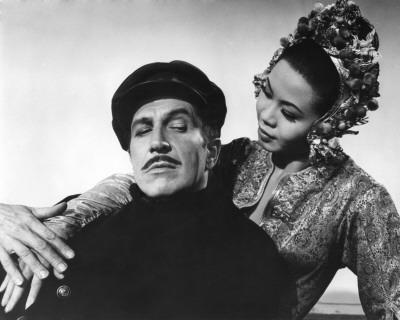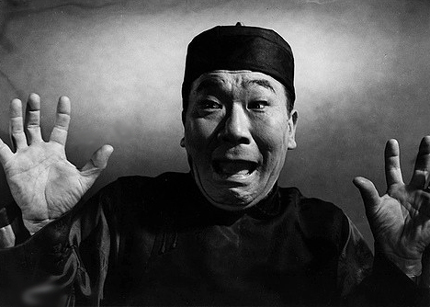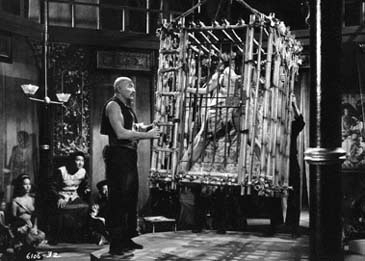
 |
|
|
|
Thomas De Quincey is held in high regard as a 19th century man of letters and an early investigator into the altered perceptions of drug use. Condemned in his time for popularizing the idea of recreational drug use, De Quincey's subjective observations remained the authoritative word on laudanum (opium + alcohol) use for decades: drug use was too sordid to be the subject of serious scientific study until the late 1800s. Reading about De Quincey, we discover that some of his writing were lost before they could be published -- it is said that "he worked by candlelight, and had an unfortunate propensity to set things -- his papers; his hair -- on fire." 
De Quincey's poetic style was also suited to fantasy, and curious filmmakers are drawn to fantastic subjects in the public domain. His 1845 Suspiria de Profundis was mined by Dario Argento for its strange particulars (and mysterious title). The author's first work, Confessions of an English Opium-Eater from 1821 provides the title for wildcat exploitation producer Albert Zugsmith's bizarre 1962 Chinatown thriller, Confessions of an Opium Eater. The movie is a coveted title for fans of actor Vincent Price, at that time contracted with American-International Pictures to appear in highly successful gothic horror movies. With his imposing good looks and a cultured voice capable of making the worst dialogue read like Shakespearian prose, Price was highly sought as a new icon of horror villainy. Some incidental evidence indicates that Confessions may have been considered for release by A.I.P., but it is likely that moguls Arkoff & Nicholson would find it too arcane, too adult and too tame to be one of their youth-oriented matinee chillers. Nevertheless, plenty of kids saw it in Allied Artists matinees, and probably couldn't make head or tails of it. But Confessions had Vincent Price, and in 1962 Vincent Price was a guarantee of kid interest. A slave ship manages to land some "Chinese Brides" on a beach, only for a fight to break out. All the participants are Chinese. It is the early 20th century, and gunrunner Gilbert de Quincey (Vincent Price) identifies himself as a descendant of the famous Thomas. Chinatown has been quarantined because of a Tong War over the issue of slave auctions. Gilbert slips through the street barriers and makes contact with the sinister, power-hungry Ruby Low (Linda Ho). His Ling Tang tattoo marks him as an ally, but neither trusts the other. Gilbert would like to find his friend George Wah (Richard Loo) but everyone claims he is dead. George was committed to ending the auctions, which Ruby says are necessary because so many Chinese men in America have no wives. Marked for death, Gilbert dodges hatchet men and sniper bullets in the empty streets. He climbs into a building and tries but fails to free a frightened new arrival, Lotus (June Kim aka June Kyoto Lu). Gilbert defeats more hulking Chinese with swords but is running out of options. A "little person" Chinese woman befriends him and eventually helps him find Lotus and the secret location of the auction. But Gilbert is forced into an opium parlor and imbibes. A fearful nightmare ensues, after which he finds himself fleeing and fighting even before the effects of the drug have worn off. Can he rescue Lotus and find out if George Wah is really dead? Where is the notorious Chinatown Tong boss Ling Tang, and why doesn't he show himself? Confessions of an Opium Eater is bizarre with a capital "B", a movie that got released even with its drug-related subject matter named in the title -- which for a subsequent re-issue was changed to Souls for Sale. The movie abounds in weird imagery -- masks, women in bamboo cages, and an unmotivated white horse charging into a Tong battle fought with hatchets and machine guns. The mostly flat direction is by producer Albert Zugsmith. Joseph Biroc fashions some nice lighting along the way, while pro art director Eugene Lourie, taking a step back from directing, fashions some fairly evocative sets. 1 One does wonder if Zugsmith inherited the film's underground sewer passageways and Chinatown exteriors from some other picture. Fortunately, Vincent Price's committed performance ties it all together. Like his The Last Man On Earth, Confessions is a movie in which Price is required to do action hero duty. Zugsmith's stuntmen help sell the illusion that Price is the one climbing up the sides of buildings and trading punchdes with Tong henchmen. 
Screenwriter Robert Hill comes up with heaping mouthfuls of baroque dialogue, that Price and the almost exclusively Chinese-American cast handle with ease. Some of the philosophical bon mots emerging from the Chinese actors sound like Charlie Chan-isms minus the humor. After a few minutes the way people talk begins to have its own psychedelic effect:
Gilbert de Quincey: "Somehow I think you wear more faces than there are stars in the gutter after the rain." Only the little person / midget playing Gilbert's little helper seems to be an Anglo with special eye makeup. For Asian actors, "Everybody works!" films like Flower Drum Song are few and far between. Confessions has several good speaking parts and many good bits for Chinese actors, who were probably too happy to find good work to complain about the storyline's racist aspect. Pliable "China Doll" Lotus looks longingly at Gilbert and chirps, "'I not know how thank you." Ruby Low turns out to be a bona fide Dragon Lady, suitable for Terry and the Pirates. The picture promotes the idea that Chinatown is a warren of sinister tunnels, creepy secret opium dens and slave auction parlors run by "inscrutable" yet lust-filled old men. Crying, starving women are suspended in cages, which roll through rooms as if the Tong headquarters were a Disney theme park ride. The auction itself forces producer-director Zugsmith to show his cards: the women brought out for bidding perform 'exotic' dances straight from some choreographer's imagination. One Chinese dancer makes left-right head moves more in keeping with Indian or Thai exhibition dancing. The second dancer/auction item does a 'Polynesian' dance. Her prospective buyer shakes with lust. When another girl comes out, the customers deem the price too high: "Only old man have that kind of money and only a young man can tame her!" Hardly appropriate dialogue for a kiddie matinee. But the unseen Ling Tang is a cheat - as the Polynesian charmer is revealed to be baldunder a wig. When Lotus is purchased, the auctioneer finds out that the opium offered for payment is bogus. Moral -- don't expect a fair bargain during a Tong War. The film's drug content sees Gilbert toking away at an opium pipe, while the special effects people (Jack Rabin?) have a field day. Gilbert says that "That stuff buys nightmares" and that's exactly what he gets, a fairly creepy montage of death imagery accompanied by weird noises. Among the grisly sights are an alien's eyeball-hand from Invasion of the Saucermen, the face of the Voodoo Woman, Bert I. Gordon's The Spider and what looks like an aquatic monster from Saga of the Viking Women and their Voyage to the Waters of the Great Sea Serpent. As those are all A.I.P. pictures, at the very least Zugsmith made some kind of deal with Arkoff and Nicholson. Or make your own guess. This being low-budget Hollywood, the footage could well have magically surfaced by other means. The best effect in Gilbert's opium nightmare are distorted shots of faces, parts of which suddenly 'pop' forward as if a blister suddenly formed in a funhouse mirror. 2 
Gilbert's opium delirium continues as he is forced to flee the parlor and engages in four or five minutes of running, fighting and diving through windows in slow motion, silently. The effect must have been fairly dislocating for audiences of 1962. Vincent Price's weird behavior here, and his goofy acid trip in William Castle's The Tingler were formative images of drug experiences early in the 1960s. Combine those with the weird effects of eye drops in X - The Man with the X-Ray Eyes and more Vincent Price dream hallucinations in the Corman-Poe films, and low-budget fantasy filmmaking made a substantial contribution to '60s proto-psychedelia: "Was I dead or was I only beginning to live?" All in all, Confessions of an Opium Eater can be slow going, but stays true to its glum vision with a resoundingly downbeat ending. It joins the ranks of movies narrated by their heroes from some future point, that become self-contradictory when the hero "becomes one with the gods in the gutter after the rain." Having seen some of the other Albert Zugsmith productions of the '60s, which include seriously inane comedies The Private Lives of Adam and Eve and Sex Kittens Go to College, indescribable efforts (Psychedelic Sexualis) and the occasional worthwhile curiosity (The Chinese Box) Confessions comes off as marginally commercial and relatively sane. Just remember that Zugsmith had been a powerhouse at Universal, where he produced Douglas Sirk's Written on the Wind and The Tarnished Angels, Jack Arnold's The Incredible Shrinking Man and Orson Welles' Touch of Evil. Let's assume that when Zugsmith's filmography went Psychotronic, doing so was his personal preference. 
The Warner Archive Collection DVD-R of Confessions of an Opium Eater is a quite good enhanced widescreen transfer of Albert Zugsmith's bizarre detour into Chinatown weirdness, twenty years before John Carpenter and Big Trouble in Little China. Albert Glasser's music score may be partially made of library stock cues, as the theremin-like wailing on the tracks sounds familiar from a number of outer space movies. Joseph Biroc's B&W images are fairly clean and reasonably sharp; Vincent Price fans will enjoy his many dramatically lit close-ups. Heck, Vincent Price fans are notorious completists, so this title will put many of them one rare title closer to "having 'em all".
On a scale of Excellent, Good, Fair, and Poor,
Confessions of an Opium Eater rates:
Footnotes:
1. Minor gripes -- those Chinatown sets often look like a redressed Western back lot construction. When the hero is escaping through various rooms in the Tong headquarters building, we see several bathroom stalls that appear to have pay toilet hardware attached to the doors. Other details make placing the date for the show a little difficult. The only car we see is surely a pre- 1915 model, but one of the Tong fighters brandishes a Thompson submachine gun, which first became available in 1921.
2. In Lucy Chase Williams' book on Vincent Price, The Complete Films Of Vincent Price, she says that Confessions was announced as a William Castle project in '59, to be shot in color in Japan. On the cover page of Price's copy of the script, he had crossed out " by Thomas De Quincy" and in its place written, "Peking Noodle Company," with the added comment "the death of me." (Thanks to Gary Teetzel)
Reviews on the Savant main site have additional credits information and are often updated and annotated with reader input and graphics. Also, don't forget the 2011 Savant Wish List. T'was Ever Thus.
Review Staff | About DVD Talk | Newsletter Subscribe | Join DVD Talk Forum |
| ||||||||||||||||||